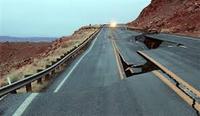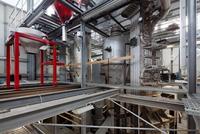-
Renewable energy could economically replace fossil-based energy in Australia
A carbon price of between AU$50 and AU$100 per ton of carbon dioxide would make coal-fired and gas-fired power in Australia less economical than renewable electricity. A new study says that all fossil-fuelled power stations in Australia’s National Electricity Market could be phased out and replaced economically and reliably with commercially available renewable energy technologies by increasing the carbon price to this “medium” level.
-
-
U.S. nuclear industry faces a wave of nuclear power station retirements
A wave of U.S. nuclear power station retirements is on the horizon. The typical design life of a nuclear power plant is 40 years. There are 104 nuclear power plants in the United States, and their average age is 34 years — only a few years short of, and fast approaching, their design life. Almost 30 U.S. commercial and research reactors already have started decommissioning. A $400 million is regarded as the bargain basement price tag for cleaning up a single reactor.
-
-
Fully secure communication
Can worldwide communication ever be fully secure? Quantum physicists believe they can provide secret keys using quantum cryptography via satellite. These physicists have, for the first time, successfully transmitted a secure quantum code through the atmosphere from an aircraft to a ground station.
-
-
Large robotic jellyfish to patrol the oceans

The Office of Naval Research wants to place self-powering, autonomous machines in waters for the purposes of surveillance and monitoring the environment, in addition to other uses such as studying aquatic life, mapping ocean floors, and monitoring ocean currents. Researchers have built a device for that purpose — a life-like, autonomous robotic jellyfish the size and weight of a grown man, 5 foot 7 inches in length and weighing 170 pounds.
-
-
Engineers educate lawmakers about aging U.S. infrastructure

Two hundred members of the American Society of Civil Engineering (ASCE) fanned out across Capitol Hill last month for the annual Legislative Fly-In with a message: U.S. infrastructure problems are solvable if we have strong leadership in Congress. The ASCE members highlighted the nation’s need to eliminate the backlog of infrastructure deficiencies, modernize roads, bridges, water systems, and energy grid – and reminded Congress that to promote commerce and protect public safety, welfare, and the environment, infrastructure investment is a priority issue.
-
-
Water treatment plant ozone upgrade wins civil engineering award
The Ozone Upgrade and Expansion Project of the Alvarado Water Treatment Plant in San Diego, California, was named the winner of the American Society of Civil Engineers (ASCE) 2013 Outstanding Civil Engineering Achievement (OCEA) Award. In addition to expanding plant capacity by 67 percent, the city of San Diego converted from chlorine to ozone disinfection. The incorporation of ozone enabled the city to provide not only safer water with lower levels of carcinogenic disinfection by-products, but also water that is odorless and better tasting.
-
-
Americans support preparation for extreme weather, coastal challenges: survey
The challenges posed by rising sea levels and increasingly severe storms will only intensify as more Americans build along the coasts. A just-released NOAA report predicts that already crowded U.S. coastlines will become home to an additional eleven million people by 2020. A Stanford survey finds that the majority of Americans support stronger coastal development codes. Among the most popular policy solutions: stronger building codes for new structures along the coast to minimize damage, and preventing new buildings from being built near the coast.
-
-
Obama promotes private-public infrastructure investment plan
President Barack Obama spent Friday afternoon at the Port of Miami where he announced his plan to attract private investment for big infrastructure projects. One such project is a $2 billion upgrading plan for the port. Obama also he would continue his push for a $100 billion infrastructure bank.
-
-
Using waste heat to capture CO2 before it goes up in smoke

Power plants fired by coal and natural gas account for about half of the CO2 that humans add to the atmosphere each year; these power plants are prime candidates for new technology that captures CO2 before it goes up in smoke. Researchers seek to optimize CO2 removal from power plant emissions by employing waste heat. This is just one example of looking to improve upon a tried-and-true technology for CO2 capture. That technology — a two-phase chemical process — has been used for decades to remove naturally occurring CO2 from natural gas.
-
-
U.S. to cut mineral payment to states by $110 million between now and August
The U.S. Department of Interior will cut its federal mineral payments to thirty-five states by $110 million due to the federal budget cuts. Different states will lose different amounts of money: Wyoming tops the list with $53 million in lost federal mineral payments over the next five months, while North Carolina is bringing up the rear, with the federal government cutting its mineral payments to the state by $7 (seven dollars) between now and August.
-
-
U.S. water infrastructure is in a serious state of disrepair
The U.S. water system is in a state of disrepair, and is deteriorating further every year for lack of money for maintenance and upkeep. The results include an estimated 240,000 water main breaks each year and nearly 14,000 dams — or one out of every seven dams — in the United States rated as “high hazard,” meaning that the flush of water from a broken dam would likely kill people.
-
-
Draft cybersecurity bill to increase penalties for hacking substantially
A draft of a cybersecurity bill circulating among House Judiciary Committee members would strengthen a computer hacking law. The draft would stiffen penalties for cyber crimes and establish a standard for companies to tell consumers when their personal information has been hacked. The bill would also change an existing law, making a cyber crime attempt punishable as an actual offense.
-
-
U.K. outlines its long-term nuclear future
Over the next two decades it is forecast that, globally, there will be £930 billion investment in building new reactors and £250 billion in decommissioning those that are coming off line. The nuclear new build program in the United Kingdom alone could generate up to 40,000 jobs in the sector at its peak. Government publishes industrial strategy to enable the UK to seize the opportunities for economic growth in the nuclear industry.
-
-
Coming soon: fuel made directly from CO2 in the atmosphere
Excess carbon dioxide in the Earth’s atmosphere created by burning of fossil fuels is a major driving force of global climate change. Now, researchers have found a way to transform the carbon dioxide trapped in the atmosphere into useful industrial products – including biofuels made directly from the carbon dioxide in the air.
-
-
Fluctuating wind power as a solution rather than a problem
Incorporating wind power into existing power grids is challenging because fluctuating wind speed and direction means turbines generate power inconsistently. Coupled with customers’ varying power demand, many wind-farm managers end up wasting power-generation capacity and limiting the service life of turbines through active control in order to avoid any possible damage to the power grid from spikes in supply.
-
- All
- Regional
- Water
- Biometrics
- Borders/Immig
- Business
- Cybersecurity
- Detection
- Disasters
- Government
- Infrastructure
- International
- Public health
- Public Safety
- Communication interoperabillity
- Emergency services
- Emergency medical services
- Fire
- First response
- IEDs
- Law Enforcement
- Law Enforcement Technology
- Military technology
- Nonlethal weapons
- Nuclear weapons
- Personal protection equipment
- Police
- Notification /alert systems
- Situational awareness
- Weapons systems
- Sci-Tech
- Sector Reports
- Surveillance
- Transportation
Advertising & Marketing: advertise@newswirepubs.com
Editorial: editor@newswirepubs.com
General: info@newswirepubs.com
2010-2011 © News Wire Publications, LLC News Wire Publications, LLC
220 Old Country Road | Suite 200 | Mineola | New York | 11501
Permissions and Policies
Editorial: editor@newswirepubs.com
General: info@newswirepubs.com
2010-2011 © News Wire Publications, LLC News Wire Publications, LLC
220 Old Country Road | Suite 200 | Mineola | New York | 11501
Permissions and Policies
